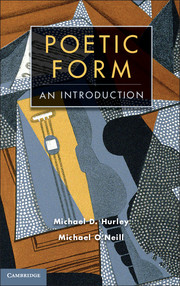Introduction
Published online by Cambridge University Press: 05 November 2012
Summary
Thou, silent form, dost tease us out of thought / As doth eternity
Keats, ‘Ode on a Grecian Urn’ (1820)Overview
Form is a poem’s principle of life. It is protean, multiple, ever-changing. It presents itself under many different guises. It can tend towards the condition of an enabling space. The poet Meg Tyler, watching her small son crawl round her study, never repeating ‘the same pattern of movement’ or exactly the same sounds, feels she has found an analogy for the sonnets she writes. Poetic form gives expressive shape to the runtogetherwords of e. e. cummings, the staccato, dash-divided phrasing of Emily Dickinson, the ‘joking voice’ (16) that half-belies ‘disaster’ (3) in the reinvented villanelle of Elizabeth Bishop’s ‘One Art’ (1976). It bears witness both to poetry as an art with a common history and to the pursuit of individual accomplishment. It can sign ambiguous treaties with apparent formlessness (Ezra Pound), oversee playful serendipities (Paul Muldoon), underwrite an aching love of high order (Gjertrud Schnackenberg). If poetry is a series of verbal becomings that yearns to take on a final being, it is form that orchestrates the desired transformation. Or, as T. S. Eliot puts the matter, ‘Only by the form, the pattern, / Can words or music reach / The stillness’.
The present study argues that poetic form is the essence of poetry, possibly unanalysable when all is said, but always prompting analysis. Form deserves, the book argues, to be accorded centre stage in any discussion of poetry. Since Plato’s attack in The Republic on poetry as, at best, ‘two steps away from reality’, poetry’s delight in ‘images’ has always been on the back foot in philosophical terms, its fascination with what Plato would see as secondary ‘forms’ evidence of its potentially suspect nature. All defenders of poetry have to ‘come to terms with Plato’s devastating attack on poetry as inferior and deceptive mimesis’ and as possessing a siren-like sensuousness that may lead away from seriousness and truth. Our own defence is based on poetry as a unique way of knowing, and on poetic form as enabling such knowledge-as-knowing through the experience of reading.
- Type
- Chapter
- Information
- Poetic Form , pp. 1 - 15Publisher: Cambridge University PressPrint publication year: 2012

